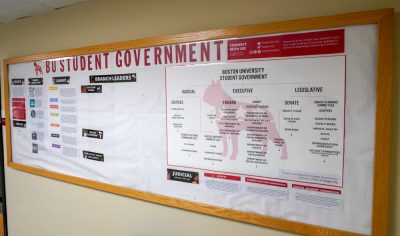Boston University Student Government reallocated the Community Service Fee budget of $2.3 million dollars on Monday night, changing distributions of funds for campus organizations and for academic student governments in each college.

CSF is a mandatory fee that is charged to all students every semester, along with their tuition. “Funds collected through the Community Service Fee are allocated directly to support student organizations, both online and in-person programs, and services, and are carried over year to year,” according to the BU Student Accounting Services website.
The CSF subcommittee including Dhruv Kapadia, a junior in College of Arts and Sciences and the student body president, went through six weeks of negotiations, brought up a recommendation Monday night and the legislature passed through the Senate floor.
“It’s a portion of our tuition, it funds every single student organization on campus, and there isn’t a lot of transparency or real kind of feedback regarding the distribution of that money,” Kapadia said. “There was ultimately strong support from the Dean of Students office as well, because this allocation has not changed for the better part of a decade.”
Hanna Dworkin, a junior in CAS who is the Senate Chair and Arbitrator of the CSF Subcommittee, emphasized that the new distribution reflects student opinions and student voices.
“Any changes that were made were voted on by representatives of these organizations, so it passed unanimously,” Dworkin said. “So we’re really hoping that this will overall [make everyone] be happy with it, and everyone will benefit from it.”
The reallocation includes the Allocations Board receiving a cut from 45.5% to 45% and the academic student government receiving a gain from 7.75% to 8%. The 8%, which is about $184,000 in total, will be distributed to the individual academic student governments.
Colleges with large student populations like CAS, College of Communication, Questrom School of Business and College of Engineering saw about a 1% decrease from the previous years, while Wheelock College of Education and Human Development and School of Hospitality Administration’s budget saw a 1.9% increase in their budget.
“When we came together with [SHA and Wheelock, they said] ‘Look, we need some more money if we want to be a robust student government because this isn’t cutting it for us,’” Kapadia said. “[The new distribution] created a floor threshold so that they could receive funding that is hopefully more adequate in years to come.”
Club sports received a financial increase from 4% to 4.75% in order to “help offset significant demonstrated student out-of-pocket expenses incurred by club sports members,” according to the resolution.
Sydney Butler, a sophomore in COM who is a club figure skater, said although the University helps with the traveling aspects, she pays around $400 per semester which she thinks is “a lot out of [her] own pocket.”
“I think [the reallocation] would be a great thing not only for like the logistical aspect of it, but just to show the athletes BU really cares about what they’re doing,” Butler said. “It would just be a great way to feel reconnected to the administration and the people that we’re representing.”
The resolution for the distribution of the 2023-24 CSF is to be sent to the DOS by Dworkin and Kapadia, where the DOS would ultimately make it effective.
“The Dean of Students office needs to approve it, which they’ve said that they would, but obviously it needs to happen,” Kapadia said. “The goal is we pass this distribution by the end of March of every year, and we propose it to the Dean of Students Office, and they implement it for the following academic year.”
























































































































Joe Student • Mar 28, 2023 at 11:19 am
This entire process felt like a sham from the beginning. The students running this committee were seemingly provided no guidance and ultimately had no knowledge of how to conduct such a committee – and they admitted as much during the process. They also admitted they were given parameters of what certain things could and could not be cut – and to what extent. This process began because it was discovered that the Dean of Students office was sitting on a half million dollar slush fund of unused money (as reported by the FREEP last September). Allocations board refuses to produce any sort of data about how many groups they are providing their 1.5 million in funding to on a yearly basis. DOS set this process up to be able to wash their hands of any complaints about where the money is going by being able to claim that it is now being decided upon by students – even though those students have no idea what they’re doing.